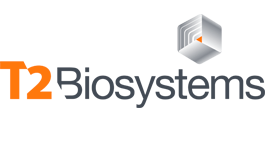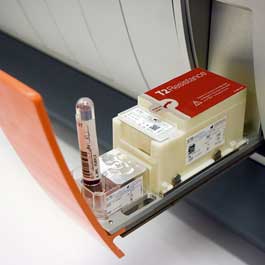

T2 Biosystems Lexington, MA, USA
www.t2biosystems.com
T2’s superbug detector is first product to launch from CARB-X
T2 Biosystems’ diagnostic panel can identify superbug drug resistance days faster than current methods
Just three years after CARB-X was launched, the first diagnostic – capable of screening blood for genes associated with antibiotic-resistant organisms in mere hours – has graduated from the CARB-X portfolio and is hitting the market in Europe and elsewhere.
Developed by a Boston-area company, T2 Biosystems, the T2Resistance Panel rapidly determines whether a person’s blood contains genetic markers associated with drug-resistant organisms. Critically, this information can be used by clinicians to determine which drugs are most likely to successfully treat those organisms.
Speed of diagnosis is critical in the fight against drug-resistant bacteria. The faster a clinician can get a clear picture of which strains are causing the infection and which antibiotics are most likely to work, the more likely the patient is to recover and survive. Standard diagnostic procedures require laboratory cultures, a process that can take days to produce results. The T2Resistance Panel quickly identifies the presence of genetic markers of drug-resistant organisms in three to five hours from a whole blood sample drawn directly from a patient.
“Other technologies require blood to be cultured before resistant genes can be detected because [the microbes and their genes] are present in low concentration levels,” says John Sperzel, President and CEO of T2 Biosystems. “Every hour delay of effective antibiotic therapy increases mortality by about 8% in patients with septic shock.”
Sepsis is a life-threatening condition caused by the body’s natural response to an infection – the release of chemicals into the bloodstream to fight the infection. Sepsis occurs when the body’s response to these chemicals is out of balance, triggering changes that can damage multiple organ systems. It is estimated that sepsis kills about 11 million people globally each year, including an estimated 270,000 in the US alone.
In 2017, T2 Biosystems received a $2 million grant from CARB-X to accelerate development of the T2Resistance Panel. CARB-X funds the development of innovative diagnostics, antibiotics, vaccines and other life-saving products to address the global threat of drug resistance.
The name of T2 Biosystems is a nod to its technological foundation. In physics, “T2” is the measurement of how fast a molecule’s protons spin in the presence of magnetic fields—the very premise that T2 Biosystems has built their diagnostic upon. Using tiny nanobeads covered in DNA capture probes that glom onto drug-resistant genes, T2’s diagnostic uses magnetic resonance, known as T2MR, to screen whole blood for nanobead clusters. Depending on the presence of clusters, and how fast their protons spin, the diagnostic can provide a readout of what drug-resistant genes are in the blood—signaling which superbugs are present and which drugs would be most effective.
The T2Resistance Panel can identify 13 of the most serious resistance genes on the antibiotic-resistance threat list, published by the Centers for Disease Control and Prevention (CDC), including genes indicating resistance to common antibiotic therapies such as penicillin.
Sperzel added, “the CARB-X funding was critical in accelerating both the development and commercialization of the T2Resistance Panel.”
The news of the diagnostic graduating from the CARB-X portfolio follows the recent announcement that T2 Biosystems has been awarded a milestone-based contract of initial value of $6 million with a potential value of up to $69 million, if all contract options are exercised, from the Biomedical Advanced Research and Development Authority (BARDA), within the Administration for Strategic Preparedness and Response (ASPR) at the US Department of Health and Human Services’ (HHS). BARDA is also the main US founder and funder of CARB-X.
For more information on the T2 Magnetic Resonance panel, click here to see T2’s poster presentation during 2019 ID Week in Washington, DC.
Published on April 6, 2020


